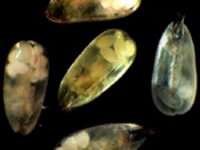Ancient asexuals: the boys are back in town

The record-holders for the longest abstinence from sex may be about to lose their status, following a discovery on a Japanese island. Every specimen of darwinulid ostracod (a shrimp-like freshwater animal with a hinged shell) that has been examined over the past century has been a female, including fossil ones up to 208 million years old. That makes them the oldest multi-celled creatures to have survived without sex.
But now a team of scientists - Dr David Horne from Queen Mary, University of London, Dr Robin Smith from Lake Biwa Museum, and Dr Takahiro Kamiya from Kanazawa University, Japan - have been amazed to discover three specimens of a new species of darwinulid ostracod - which are males.
Asexuality is generally thought to be a route to extinction, because it leads to an accumulation of bad genetic material. So what is the darwinulids’ secret?
Each female produces eggs by cloning, which she broods in a bulge at the end of her shell. There are occasional mutations and some remixing of genes through egg-cell division, but despite this their genetic make-up is remarkably uniform.
Dr Horne explains: “Biologists theorize that darwinulids have simply developed a wonderfully all-purpose genetic makeup, giving rise to a long evolutionary life without the bother of sex. Thousands of specimens have been studied in the past, with no sign of a male; now, a bit like London buses, three have come along at the same time!”
The discovery of these three males now means that the record for life without sex may pass to bdelloid rotifers, which are believed to have abstained for up to 40 million years.
The gender of the new darwinulids was determined mainly by their paired copulatory organs and limbs modified for clasping females during sex, as well as their lack of a brood pouch. But puzzlingly, no sperm was found. This could have been used up during mating.
The other possibility, though, is that the males are non-functional aberrations – relics from a time when their ancestors were sexual. If that proves to be so, darwinulid ostracods will retain their reputation as the animals that have survived the longest time without sex.
Source: Queen Mary, University of London















